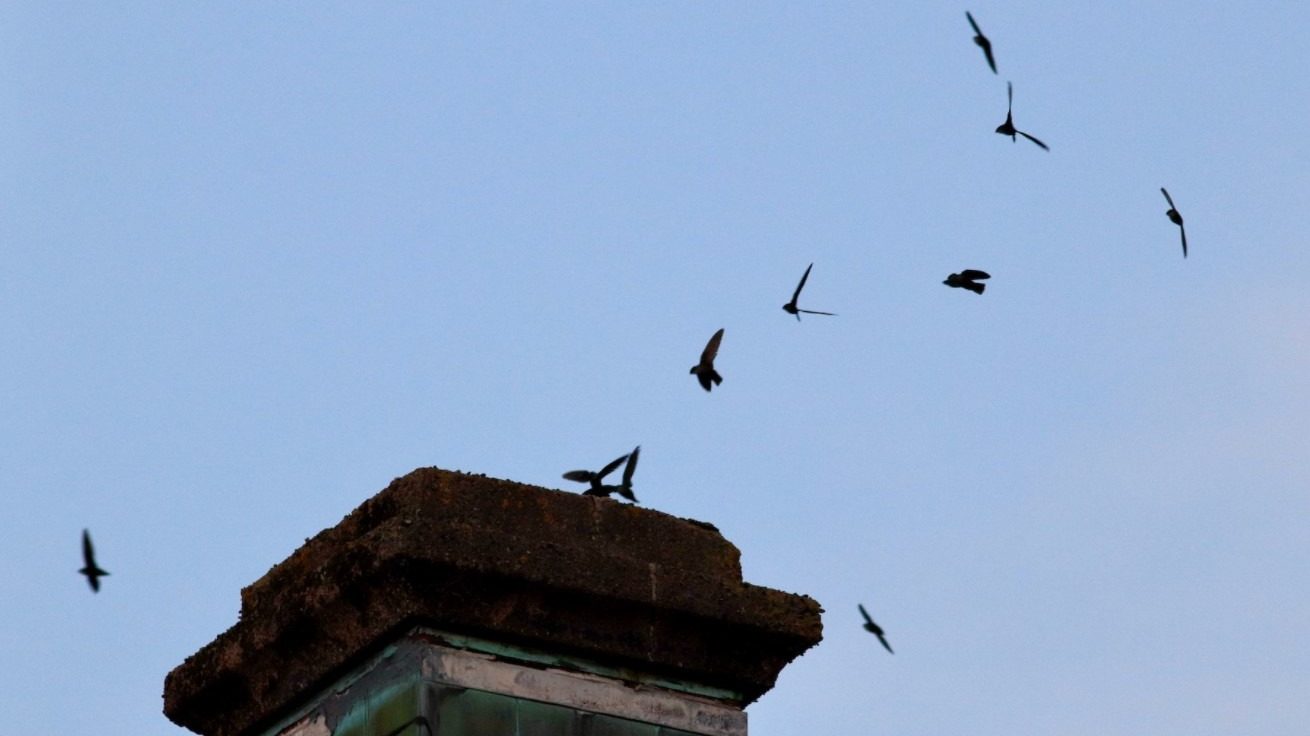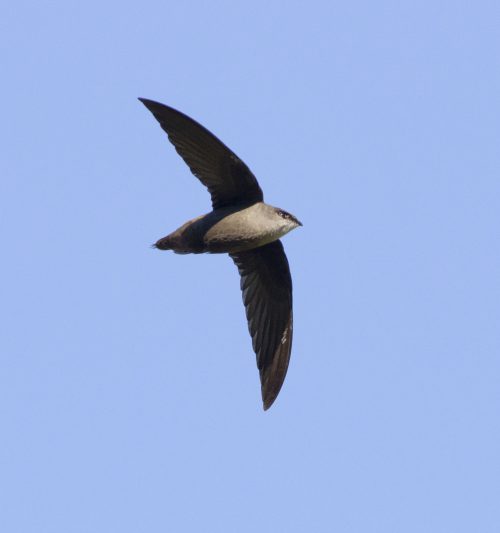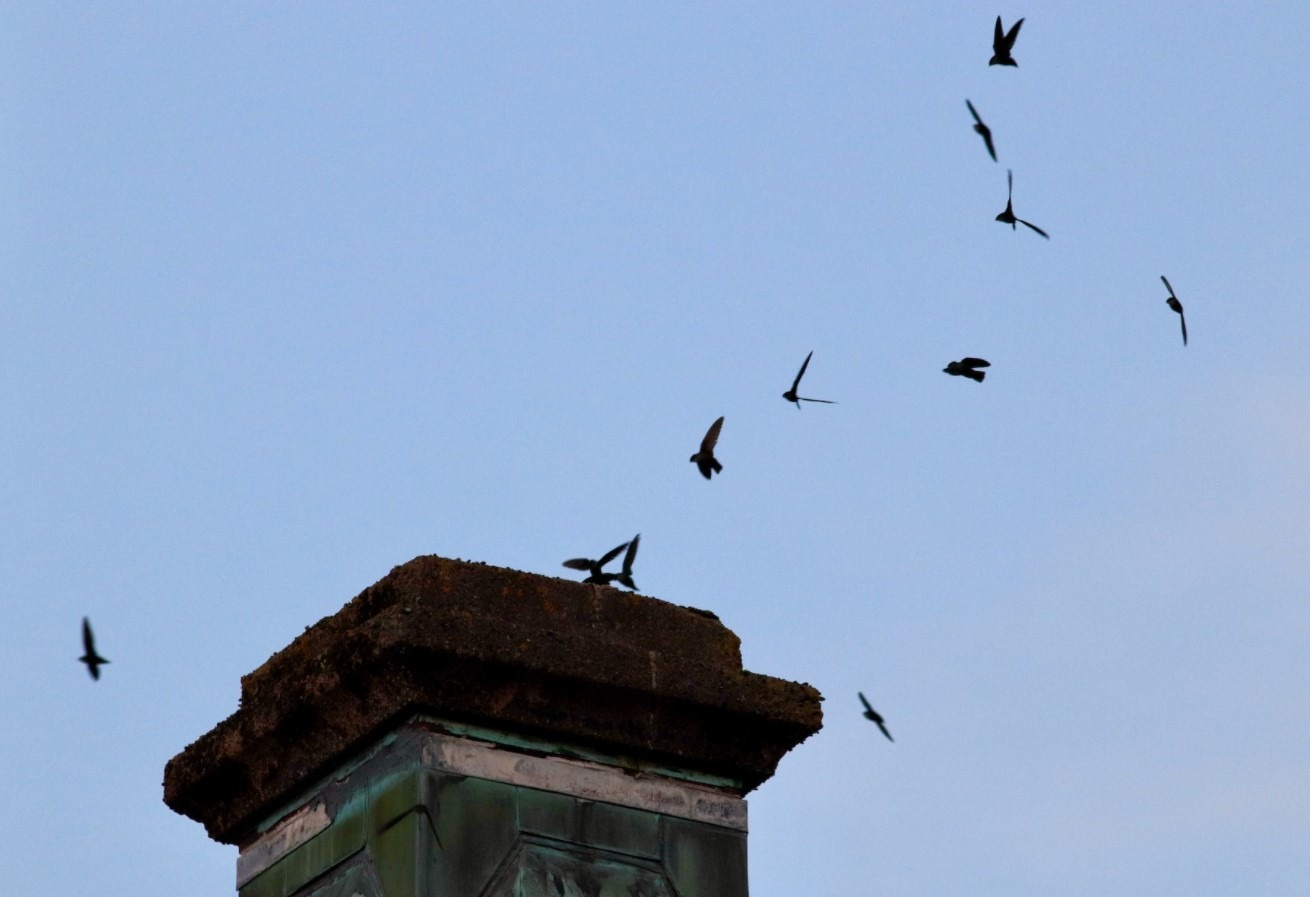By Claire Marshall, Aerial Insectivore Field Technician, and Natasha Barlow, Ontario Projects Biologist

Chimney swifts entering a chimney to roost. Photo: George Forsyth
Behind the scenes, Birds Canada’s SwiftWatch programs are working with municipalities across provinces to find a solution for the rapid loss of chimneys used by Chimney Swifts – a Threatened Species in Canada.
Historically, Chimney Swifts relied on old-growth forests, where they sought hollow trees to spend the evening at the end of a long day of foraging for insects. With the loss of old-growth forests, Chimney Swifts began to use a human-made habitat that closely resembled these hollow structures – you guessed it, chimneys!
Visiting Chimney Swifts cause no harm to the structure of a chimney, and do not build up enough debris during their temporary stay to pose a threat to human health. And by the time temperatures drop and you need to start up the fireplace, Chimney Swifts will be well on their way south for migration and overwintering.
Birds Canada, along with other conservation organizations, have been collecting data on Chimney Swifts for over ten years. With passionate volunteers across Ontario and the Maritimes, we have a growing dataset that shows what chimneys are being used, how frequently, and by how many Chimney Swifts each breeding season and during migration.
But finding a species at risk is just the first step.
We are working on making the next leap to actively protect these chimneys in Canada from being destroyed or altered in ways that affect Chimney Swifts’ ability to enter the structure. And of all the municipalities we are working with in Ontario, the City of London is leading the way, by including SwiftWatch data in their internal planning processes showing their dedication to being a true Bird-Friendly City. Every time a site alteration or development consultation is requested, the City Ecologist Planners cross-reference the address on their internal mapping tool to check if the location is known to host Chimney Swifts, based on data provided annually by Birds Canada and other conservation groups like Nature London (who pioneered community monitoring efforts for Chimney Swifts in Ontario!). In the case that it will impact Chimney Swifts, an Environmental Impact Study is requested. The next step is working with the provincial or federal government to determine avoidance, mitigation, or compensation requirements before approving the application.

A Chimney swift in flight. Photo: Ron d’Entremont
Even better news – The City of London isn’t the only Municipality gaining success! The Municipality of Mont-Saint-Hilaire in Québec have implemented a regulation to protect Chimney Swifts, which makes it an offence to:
- Sweep an identified chimney between May 1 and September 1
- Line or cap any chimney on a building of concern
- Harass or kill the species, or destroy its nest or eggs
This is a huge win for Chimney Swifts, and lays the foundation for other municipalities to follow suit in conserving these important urban wildlife neighbours.
Other municipalities in Ontario and the Maritimes who have incorporated SwiftWatch data into their internal mapping systems include:
- Saint Andrews, New Brunswick
- Prince Edward County, Ontario
- Collingwood, Ontario
- Fort Erie, Ontario
- Township of Parry Sound, Ontario
Facing continued pressures including loss of prey as insect populations decline, changing climates, and intense storms along the migratory path, the least we can do for this Threatened Species is to protect the remaining habitat during the breeding and migratory stopover seasons throughout Canadian provinces. Working towards protecting their habitat is exactly what some municipalities are doing – we greatly appreciate these efforts and hope that other municipalities will be inspired by these meaningful conservation efforts.
If you have questions and want to learn more about SwiftWatch and Chimney Swifts, and how your municipality, school, or workplace can get involved with protecting Chimney Swifts, reach out to us at ontarioswiftwatch@birdscanada.org (Ontario), or marswifts@birdscanada.org (Maritimes).
Interested in learning more about Chimney Swifts? Click here.

